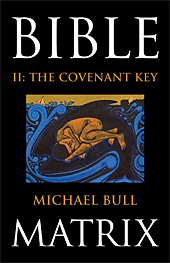Mar
1
2012
or Knife and Fire
From Bible Matrix II: The Covenant Key.
 James Jordan observes that the tools required for Adam to produce bread and wine in the Land were “Knife and Fire.” In God’s kitchen, Knife is Division (guarding cherubim), and Fire is Testing (purifying seraphim). The ascension of the Head allows the holy fire to descend upon the nearbringing sacrifice and raise up a fragrant Body of smoke from the Altar.
James Jordan observes that the tools required for Adam to produce bread and wine in the Land were “Knife and Fire.” In God’s kitchen, Knife is Division (guarding cherubim), and Fire is Testing (purifying seraphim). The ascension of the Head allows the holy fire to descend upon the nearbringing sacrifice and raise up a fragrant Body of smoke from the Altar.
Continue reading
10 comments | tags: Communion, Covenant Theology, Genesis, Totus Christus, Typology | posted in Bible Matrix
Feb
27
2012

“Conservative theologians have bravely held the fort like the guardians of heaven. Unfortunately, when it comes to biblical interpretation, they are boring as hell.“
Paul Washer recently tweeted: “The measure of biblical truth that we have grasped is not determined by the size of our heads, but the breadth of our hearts.”
The divide between the head and the heart is an issue of integrity, of holiness. But even within the realm of “head knowledge,” the intellectual level of Biblical interpretation, there is a sort of left brain/right brain divide. The issue here is not one of holiness. It is one of “intellectual sex.”
[This post has been refined and included in Sweet Counsel: Essays to Brighten the Eyes.]
Continue reading
5 comments | tags: Evangelicalism, Hermeneutics, Numbers 5, Solomon, Systematic theology, Systematic typology | posted in Bible Matrix, Biblical Theology
Feb
21
2012
or The New Jerusalem has a Moat

“I know your works: you are neither cold nor hot.
Would that you were either cold or hot!” (Revelation 3:15)
The world is a cosmic Tabernacle. The first domain of Mediatory Man was between the waters. The waters below (springs) were necessary for life but they were not “a place to live.” The waters above did likewise. However, these were temporary veils, boundaries to be crossed in an increasing advance-by-faith.
Continue reading
Comments Off | tags: Creation Week, Crystal Sea, Genesis, Laver, New Jerusalem, Noah, Revelation, Tabernacle, The flood | posted in Bible Matrix, Biblical Theology, Creation, The Last Days
Feb
16
2012

“No one can enter a strong man’s house and plunder his goods, unless he first binds the strong man. And then he will plunder his house.” (Mark 3:27 27)
A lot of commentary on the Revelation seems oblivious to the allusions to the Pentateuch (although there are many that do take it into account and are enlightening at the most obvious points). Even the “binding” of Satan in Revelation has an Old Testament background.
Continue reading
Comments Off | tags: AD70, Against Hyperpreterism, Communion, Millennium, Postmillennialism, Revelation 20, Totus Christus | posted in Bible Matrix, Biblical Theology, The Last Days
Feb
14
2012

“Let this mind be in you which was also in Christ Jesus, who, being in the form of God, did not consider it robbery to be equal with God, but made Himself of no reputation, taking the form of a bondservant, and coming in the likeness of men. And being found in appearance as a man, He humbled Himself and became obedient to the point of death, even the death of the cross. Therefore God also has highly exalted Him and given Him the name which is above every name, that at the name of Jesus every knee should bow, of those in heaven, and of those on earth, and of those under the earth, and that every tongue should confess that Jesus Christ is Lord, to the glory of God the Father.” (Philippians 2:5-11)
This passage (or pericope?) retraces the Covenant pattern, which is also played out in the flow of the history of Israel. We’ll have a look at the structure of the passage and then I want to discuss the significance of the literary placement of “every tongue.”
WARNING: Weird ahead.
[This post has been refined and included in Sweet Counsel: Essays to Brighten the Eyes.]
Continue reading
2 comments | tags: Achan, AD70, Babel, Babylon, Circumcision, Covenant Theology, Evangelism, Genesis, Herod, Joshua, Moses, Pentecost, Philippians, Postmillennialism, Systematic typology, Tabernacle, Tongues | posted in Bible Matrix, Biblical Theology, The Last Days
Feb
9
2012

“Identify…”
Putting Your Water Where Your Mouth Is
Part 1 here.
Doug Wilson recently gave a good rundown on his own doctrinal journey over the years since he began pastoring. It’s well worth a read. But the thing that stuck in my mind was his reason for moving to the practice of paedobaptism. Since he had already become Reformed in his doctrine, another minister said he should “put his water where his mouth is.” I know it was a call to consistency, but to me it highlights how the conflation of the Covenant sign with parenting allows baptism to usurp the place of preaching. It’s putting water where your mouth ought to be.
Continue reading
4 comments | tags: Baptism, Doug Wilson, Federal Vision | posted in Bible Matrix, Biblical Theology, Christian Life
Feb
6
2012
or Ethnic Cleansing as Mercy

“In representative terms, the people of God are no longer the Land but the heavenly Sea. The Church herself is the oncoming storm.”
In The Days of Vengeance [PDF], David Chilton did a great job of introducing many of us to the fact of Jesus’ use of “cosmic language” in Matthew 24 to describe the end of the Old Covenant. Not only is the idea of an actual, physical star falling to earth impossible (can you imagine the sun “falling to earth”?) but Jesus is quoting from a prophecy against Babylon. His audience would have realized this as a scathing attack against the Herods and their “government controlled” Temple worship. So, the language is clearly poetic, but why would the prophets—and Jesus and His apostles—deliberately cause so much confusion by using cosmic language to describe non-cosmic events? The answer is found in the mercy of God.
Continue reading
3 comments | tags: AD70, Baptism, Circumcision, Communion, Postmillennialism, Tabernacle, Temple | posted in Against Hyperpreterism, Bible Matrix, Biblical Theology, The Last Days
Feb
2
2012

Doing my first Bible Matrix presentation this Sunday morning (with Powerpoint) at a church in Sydney. Also have a question time at the church dinner on Saturday night. Please pray for me as I prepare. I can handle public high school kids okay, but this is a different kettle altogether!
Continue reading
5 comments | tags: Totus Christus | posted in Bible Matrix, Biblical Theology
Jan
28
2012

“For by one Spirit are we all baptized into one body,
whether we be Jews or Gentiles, whether we be bond or free;
and have been all made to drink into one Spirit.” 1 Cor. 12:13
On the BH forum, Michael Jones observed:
“If you look up the words for “drinking into” lexically (Strong’s), you come up with the idea of plants being irrigated and soaking up water through the roots. Is this somewhat valid? Are we like a bunch of trees around an oasis in the desert?” [1]
I believe that very often, the word choices of the biblical writers are hints to the literary structure — especially when their word choices are a little unexpected or ambiguous. This one isn’t unexpected, but perhaps that’s because we are so familiar with this passage. It really is an odd turn of phrase. Could the Bible Matrix shed any light on it?
Continue reading
Comments Off | tags: Baptism, Covenant Theology, Exodus, Feasts, Galatians, Literary Structure, Paul, Systematic typology, Tabernacle, Veil | posted in Bible Matrix, Biblical Theology
 James Jordan observes that the tools required for Adam to produce bread and wine in the Land were “Knife and Fire.” In God’s kitchen, Knife is Division (guarding cherubim), and Fire is Testing (purifying seraphim). The ascension of the Head allows the holy fire to descend upon the nearbringing sacrifice and raise up a fragrant Body of smoke from the Altar.
James Jordan observes that the tools required for Adam to produce bread and wine in the Land were “Knife and Fire.” In God’s kitchen, Knife is Division (guarding cherubim), and Fire is Testing (purifying seraphim). The ascension of the Head allows the holy fire to descend upon the nearbringing sacrifice and raise up a fragrant Body of smoke from the Altar.

































